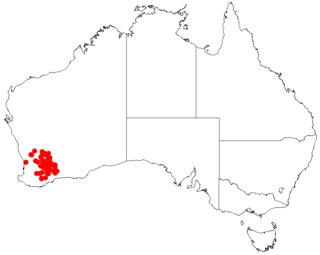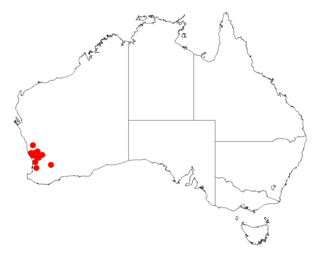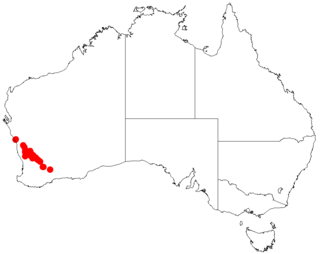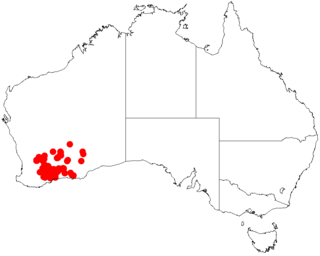
Acacia arcuatilis is a shrub belonging to the genus Acacia and the subgenus Juliflorae that is endemic to south western parts of Australia.

Acacia lirellata is a shrub belonging to the genus Acacia and the subgenus Juliflorae that is endemic to south western Australia.

Acacia resinimarginea is a tree or shrub belonging to the genus Acacia and the subgenus Juliflorae that is endemic to western Australia.
Acacia stanleyi, commonly known as Stanley's rock wattle, is a shrub belonging to the genus Acacia and the subgenus Juliflorae that is endemic to south western Australia.
Acacia sulcaticaulis, also commonly known as the Mount Mulgine fluted wattle, is a shrub or tree belonging to the genus Acacia and the subgenus Juliflorae that is native to a small area in western Australia.

Acacia wickhamii is a shrub belonging to the genus Acacia and the subgenus Juliflorae that is endemic to parts of northern Australia.

Acacia acutata is a shrub belonging to the genus Acacia and the subgenus Phyllodineae where it is endemic to south western Australia.

Acacia costata is a shrub belonging to the genus Acacia and the subgenus Phyllodineae that is endemic to Western Australia.

Acacia dempsteri is a shrub belonging to the genus Acacia and the subgenus Phyllodineae endemic to south western Australia.

Acacia hastulata is a shrub belonging to the genus Acacia and the subgenus Phyllodineae that is endemic to an area in south western Australia.

Acacia jacksonioides is a shrub belonging to the genus Acacia and the subgenus Phyllodineae that is endemic to western Australia.

Acacia merrickiae is a shrub belonging to the genus Acacia and the subgenus Phyllodineae that is endemic to a small area of south western Australia.

Acacia pulviniformis is a shrub of the genus Acacia and the subgenus Phyllodineae that is endemic to south western Australia.

Acacia robiniae, commonly known as Robin's wattle, is a shrub of the genus Acacia and the subgenus Phyllodineae that is endemic to south western Australia.

Acacia saxatilis is a shrub of the genus Acacia and the subgenus Phyllodineae that is endemic to south western Australia

Acacia dissona is a shrub of the genus Acacia and the subgenus Plurinerves that is endemic to an area of south western Australia.

Acacia eremaea is a shrub or tree of the genus Acacia and the subgenus Plurinerves that is endemic to an area in western Australia.

Acacia subflexuosa is a shrub of the genus Acacia and the subgenus Plurinerves that is endemic to an area of south western Australia.

Acacia uncinella is a shrub of the genus Acacia and the subgenus Plurinerves that is endemic to an area of south western Australia.

Acacia warramaba is a shrub of the genus Acacia and the subgenus Plurinerves that is endemic to an area of south western Australia.


















